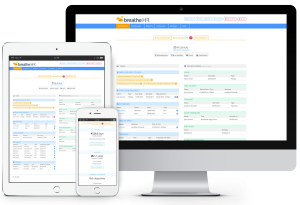1. Carry out checks on the applicant
Once you have found a suitable candidate for the position there are checks that must be completed.
- Right to work checks are legal requirement (ask the candidate to show you their passport or birth certificate or relevant visa. More information can be found at https://www.gov.uk/legal-right-work-uk
- Check that the candidate has the necessary qualifications as stated on their CV or at interview, you can ask the candidate to provide copies of their certificates. This applies to any qualification such as academic qualifications or a Fork lift truck driving licence. If it is relevant to your business, it is important to get the evidence.
Where necessary (i.e. care industry or working with children) ask the candidate to complete the DBS checks process as soon as possible
2. Make Offer and Get Acceptance
Send a written offer letter to the candidate. This document provides the employee with the conditions of employment, ask the candidate to reply in writing or email to accept the offer. If you have a period of time before the candidates start date make sure you keep in touch with them, ‘to keep them warm’, this is important for letting the new candidate know that you are looking forward to them joining the business. Let them know what will happen on their first day, and what to expect for the first weeks of employment.
3. Provide a Contract of Employment
This contract outlines the employee’s rights,
responsibilities, and working conditions. The ‘principal statement’ must include the
following details as a minimum, and can be included on an employment letter, a
written employment contract, or as a separate document.
- Name of the employer.
- Name of the employee.
- Job title and description.
- Rate of pay, and payday details.
- Working hours.
- Start date.
- Holiday entitlement (including public holidays).
- Where the job is located.
- Notice periods.
- End date (if fixed term contract)
- Information related to any collective agreements.
- Pension arrangements.
- Who to contact if you have a grievance
4. Make sure your business is adequately insured
To protect your business from claims made by employees who have been injured or fallen ill at the workplace. You must take out adequate Employers’ Liability Insurance cover due to the terms of the Employers’ Liability (Compulsory Insurance) Act 1969.
5. Register as an employer with HMRC
In almost all cases, you must register as an employer with HMRC within four weeks of taking on your first employee. As an employer, you will be responsible for paying your staff a salary and deducting any PAYE (income tax) and National Insurance Contributions from staff salaries.
6. Payments
When you pay your staff, you have to provide each employee with a payslip which details their gross and net pay, income tax and NICs deducted, and any other deductions (such as pensions contributions).
Since the implementation of the RTI (Real Time Information) regime in 2013, you must also submit payroll data to HMRC each time you pay your staff. Previously, this information needed to be provided at the end of each tax year.
You must also comply with the National Minimum Wage legislation. Go to https://www.gov.uk/national-minimum-wage-rates to find out the current rates of pay.
7. Pension auto-enrolment
New legislation means that employers must enrol their staff into a workplace pension scheme if they are aged 22 or over and earn at least £10,000 or more. (2018)
For more information go to https://www.fsb.org.uk/benefits/finance/pension-service which has a great pension set up service for small businesses.
8. Holiday entitlement, parental leave, sick pay, maternity / paternity pay
Employees are entitled to 5.6 weeks paid leave per year this is applicable to all employees including zero hours contractors, this includes bank holidays. This is calculated by working out how much of the year the employee will work and how many hours per week they work on average.
There are various rights for parents including paternity, maternity, parental leave, adoption leave. Make sure you familiarise yourselves with these in advance to avoid infringement of employment law.
9. Health and Safety
You will be responsible for providing your employees with a safe and secure environment to work in.
You don’t need a formal written H&S policy unless you have five or more employees, however you should take time to assess the risks your staff face at work and manage accordingly. Provide safe systems of work, training and protective equipment.
10. Engage Your Employee
Remember first impressions count, and for this reason it is important to start off well with your new employees. Being organised for their first day, having their contract of employment ready and being able to answer their questions regarding their employment, having their email set up and access to any IT systems are a good start.
People generally want to feel useful as soon as possible so make sure you have planned their work for the first week and month, give them a feel for the business introduce them to all significant people that they will be dealing with, start any required training as soon as possible.
It is commonly known that one of the main reasons people leave their job is because they didn’t like their boss, so have this is mind.
Give regular feedback and deal with any issues immediately, this prevents the niggles from becoming big problems and aid an open and honest working relationship.
There’s no doubt about it, being an employer can be a challenge, it can also be rewarding and greatly beneficial to your business when good employees are in place. An engaged workforce is a valuable asset, but they will ongoing management.
At Blue Tree HR Solutions, we aim to help business owners manage their employee with minimal hassle.
If you require support with managing new employees or any ongoing staff issues, please get in touch.
Our service is completely flexible in order to suit your company, please get in touch for further information 01787 695084 or melanie@bluetreehr.uk





